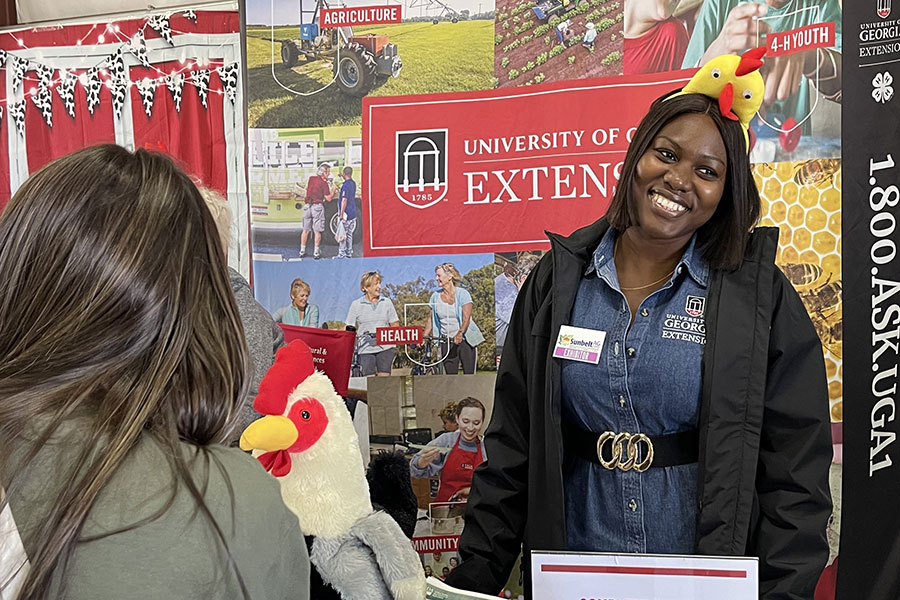
The holiday season can be a time of anticipation and joy, but balancing multiple commitments and personalities across families and friends can be a source of stress for hosts and visitors alike.
Much like preparing parts of the meal ahead of time allows you to spend more of the holiday with guests, setting expectations ahead of the celebration can go a long way to ensuring enjoyable gatherings, said Ted Futris, University of Georgia Cooperative Extension specialist and professor of human development and family science in the College of Family and Consumer Sciences.
Set clear boundaries early
“First and foremost, set clear boundaries up front and do it with kindness. Clarify what expectations you have and ask if everyone can be on the same page about that in advance,” said Futris, adding that addressing issues ahead of time can circumvent conflict.
“If you are traveling and somebody strongly disagrees about setting those parameters, you have a choice of whether you want to go or not. If everybody’s coming to you, just be very clear about the house rules — we’re not going to be talking politics, we’re not going to bring up the Falcons, we’re not talking about Georgia football, whatever it may be. It’s not OK to just say everything and anything on your mind however you want to say it.”
Being intentional about how you react to situations is also a wise move. Making plans to take a walk, play with children or a pet, or just step outside for some air are all positive ways to diffuse stress.
“You don’t have control over what others say or do. You only have control over your reaction and response to it. Know what strategies you will use to manage your own stress,” said Futris. “When you’re stressed, it’s hard to process and make decisions in the moment. Stress hormones are released, and we respond in one of two ways — fight or flight. It can be so hard in that moment to think kindly, calmly and reasonably, so plan how you might respond or what you might do to manage those emotions.”
Make a plan and stick to it
Setting a time limit for visits can also reduce the stress on busy holidays.
“Plan how much time you are going to spend. Are you setting a limit? Are you going to just wait to see how it goes and then find a graceful exit strategy should you need it? If you know you want to stay until 3 p.m. and then head home for the football game, let people know what your plans are in advance,” he added. “This way, they can also plan, and feelings don’t get hurt or offended.”
It is also OK to take a break from large holiday gatherings, but couples especially should come up with a compromise if one wants to stay home and the other wants to travel.
“Sometimes it’s a balancing act. First, take time to hear your partner because there may be more underlying concerns,” Futris said. “When couples have a disagreement or concern about what to do for the holidays or how to spend it, taking the time to hear each other out and seek to understand how they feel is the first step. By doing that, you are coming from a shared place of care and wanting to support each other, and that opens up opportunities to explore solutions.”
In most cases, letting extended family know you will be sticking close to home should not be a cause for anxiety. There is nothing wrong with being honest about needing time to yourself, Futris added.
“If you don’t want to spend half of your holiday on the road, but you still want to see each other, find alternatives like FaceTime or Zoom or other ways just to say hello and check in and connect if you can’t make it in person.”
Handle conflict with care
Futris, who directs ELEVATE for Couples in Georgia, a free relationship education initiative that helps couples across Georgia improve their relationships, recommends the “WIN” strategy for handling fraught situations.
“If you want to diffuse, or at least not ignite, the situation, start it off softly by using the WIN strategy, in which W stands for ‘when’ and you calmly describe the situation, I stands for ‘I feel’ and you share how that makes you feel, and N stands for ‘need’ and you explain what you need,” he explained. “For example, ‘When we talk about politics, I feel really stressed and anxious, and I need us not to talk about it today.’ It just kind of slows things down so you can convey what you need and deescalate the tension.”
The ELEVATE program, available to any couple in a committed relationship in the state, aims to help couples connect, have fun and develop skills that will strengthen relationships. To learn more and sign up for a free workshop, visit elevatecouplesgeorgia.com.
For more tips on handling the holidays, read UGA Extension resource “Surviving the Holidays.” For tips to strengthen your relationships, visit healthyrelationships.uga.edu.



